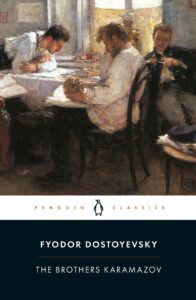Each month, we ask a member of faculty to tell us about one book that played an outsized role in making them who they are today. This month, Assistant Professor Hamza Karam Ally walks us through his Words to Live By telling us about a title he regularly returns to.

What book have you chosen?
I decided not to overthink it! The Brothers Karamazov by Fyodor Dostoevsky.
When did you first read this book?
I don’t remember the exact year, but it was prior to beginning my doctoral degree, during a spell where I had left academia for a time. Probably 2010 or 2011.
Was it a book that you read quickly or did you take your time reading it?
Reading it quickly seems self-defeating! I savored it and rationed it. In fact, reading it felt oddly like slowing my mind down, like a prayer or a meditation.
What was it about the book that first stood out to you?
I’m quite sure I have never read a book that renders all the modes and aspects of love and suffering so completely—and does so while respecting the integrity of every sort of person, from the saint to the sensualist.
Have you reread this book? If so, did you get something different from it on rereading?
 Yes, the last time was as an audiobook; it kept me company on a series of summer hikes! I have a personal ritual which involves re-reading Karamazov after every major life event (which turns out to be every 5-7 years). Each time, it seems to produce new discoveries that were previously concealed from me…
Yes, the last time was as an audiobook; it kept me company on a series of summer hikes! I have a personal ritual which involves re-reading Karamazov after every major life event (which turns out to be every 5-7 years). Each time, it seems to produce new discoveries that were previously concealed from me…
How did this book shape you?
As the book contains multitudes, it’s difficult to decide what to emphasize. But two of the more stirring revelations that stayed with me were: (i) that whether in pre-Revolutionary Russia or in any other context, every person is intimately acquainted with love and suffering, and has had to accommodate both as part of their own interior world, and (ii) that to despair of suffering and to despise the sufferer are not one and the same thing.
What do you think it is about this book that made such an impact?
Many possible answers to this as well! I have taught parts of the book in the context of social and political transformations in the 19th century. But I also find it deeply affecting as a work of moral education—on dilemmas such as, whether spiritual impoverishment is the inevitable outcome of trying to understand suffering, or whether self-indulgence and self-abnegation are as opposed as they seem. Part of its impact, I think, is that it seems to contain, in its intersubjectively constituted world, a reflection of every reader’s answer to such questions.
Who do you think should read this book?
I certainly think it has something memorable in it for everybody. For all its complexity, it is an accessible book. It does demand patience, but one does not feel penalized reading it at any stage in life, or at one’s own pace. Even Nietzsche—not exactly a fellow traveler—was praiseful of Dostoevsky!

